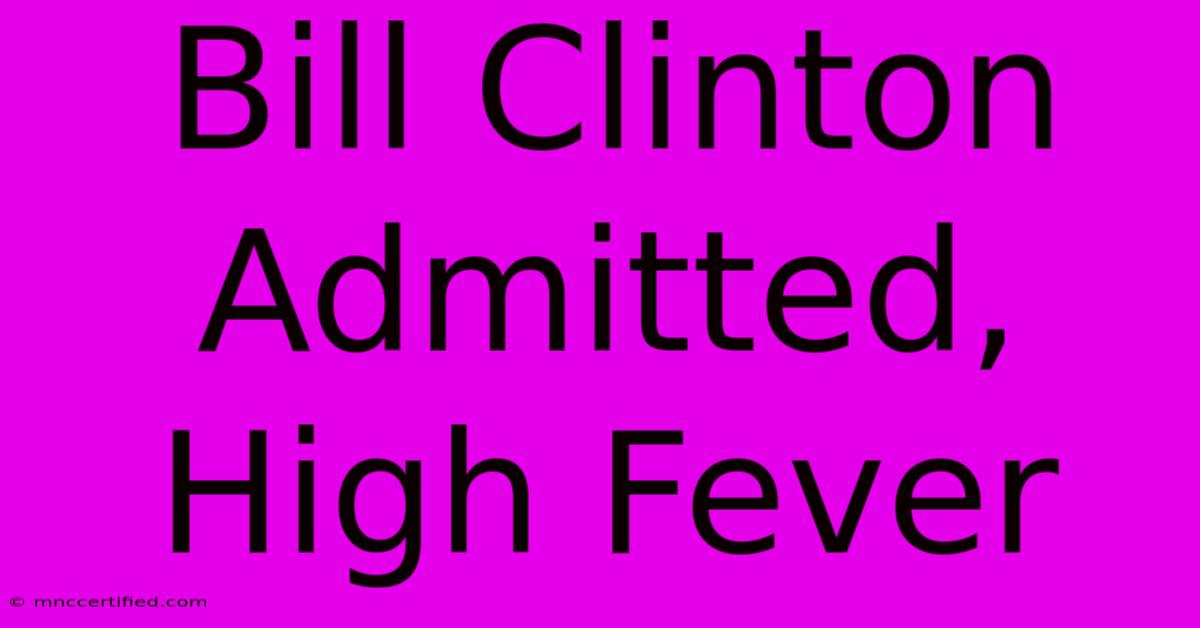Bill Clinton Admitted, High Fever

Table of Contents
Bill Clinton's Health: Addressing the Speculation Surrounding High Fever Reports
The health of public figures often attracts significant attention, and former President Bill Clinton is no exception. Rumors and reports about his health, including instances of high fever, have circulated over the years. This article aims to address these reports responsibly, separating fact from speculation and offering context where possible. We will examine verifiable information and highlight the importance of accurate reporting when discussing individuals' medical conditions.
Understanding the Sensitivity of Health Information
Before diving into specific instances, it’s crucial to acknowledge the ethical considerations surrounding the reporting of health information. Public figures, like everyone else, deserve privacy regarding their medical details. Unless information is officially confirmed by the individual or their representatives, speculation should be treated with caution and avoided as much as possible. Sensationalizing health issues can be harmful and contribute to misinformation.
Reported Instances of High Fever and Related Health Concerns
While definitive details about specific instances of Bill Clinton experiencing a high fever are scarce in reliably sourced public information, reports about his overall health have surfaced throughout his time in office and beyond. These have included:
-
Post-Presidency Health Concerns: Since leaving office, President Clinton has been open about facing various health challenges, including heart issues requiring procedures. While details about specific fevers haven't been publicly released, general health updates have been shared. This transparency offers a counterpoint to unsubstantiated rumors.
-
Importance of Context: It's important to remember that high fevers can be symptoms of a wide range of illnesses, from minor infections to more serious conditions. Any report of a high fever without further medical context is incomplete and should be viewed with skepticism.
Separating Fact from Fiction in Online Reporting
The internet age has made it easier than ever to spread information, both true and false. It's crucial to critically evaluate any claims about Bill Clinton's health and to rely on credible sources. Check the author's reputation, verify facts with multiple sources, and be wary of headlines designed to grab attention rather than inform accurately.
The Role of Responsible Journalism
Responsible journalism plays a critical role in ensuring the accuracy of information shared with the public. Reputable news organizations understand the importance of verifying information before publication and avoiding the dissemination of unsubstantiated rumors or gossip. When reporting on a public figure's health, a balanced approach that respects privacy while accurately informing the public is essential.
Conclusion: Respecting Privacy While Seeking Truth
While public interest in the health of prominent figures is understandable, it's equally important to respect their privacy and avoid the spread of misinformation. Relying on trustworthy sources and critically evaluating information are crucial skills in navigating the complexities of online reporting. In the case of Bill Clinton's health, a responsible approach prioritizes verified information and avoids sensationalizing unsubstantiated claims. Focus on accurate reporting and respect for individual privacy, regardless of the public figure's standing.
Keywords: Bill Clinton, health, high fever, illness, health concerns, medical information, privacy, responsible journalism, accurate reporting, misinformation, speculation, public figure health, credible sources, news reporting.

Thank you for visiting our website wich cover about Bill Clinton Admitted, High Fever. We hope the information provided has been useful to you. Feel free to contact us if you have any questions or need further assistance. See you next time and dont miss to bookmark.
Featured Posts
-
Christmas Day Store Openings 2024
Dec 24, 2024
-
Gaetz Accused Sex Drugs Allegations
Dec 24, 2024
-
Buehler Joins Red Sox On 1 Year Contract
Dec 24, 2024
-
31 Point Nights Knicks Beat Opponent
Dec 24, 2024
-
Playoffs Secured Packers Win Big
Dec 24, 2024